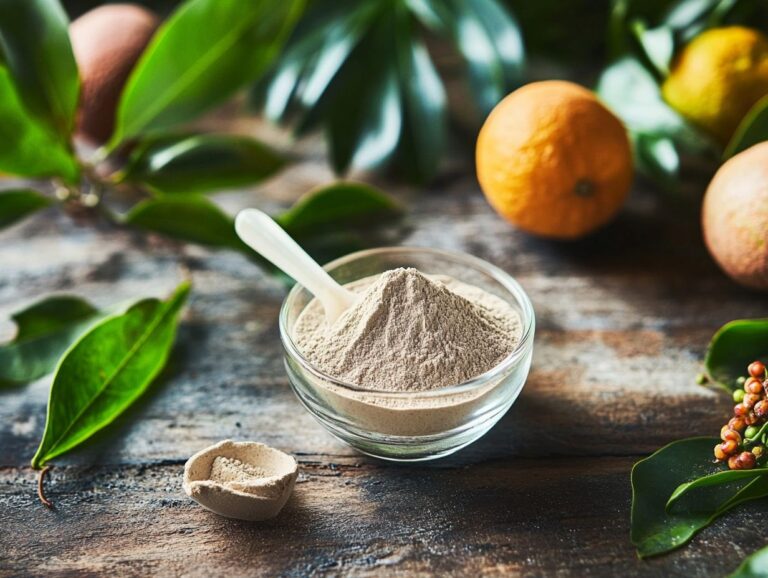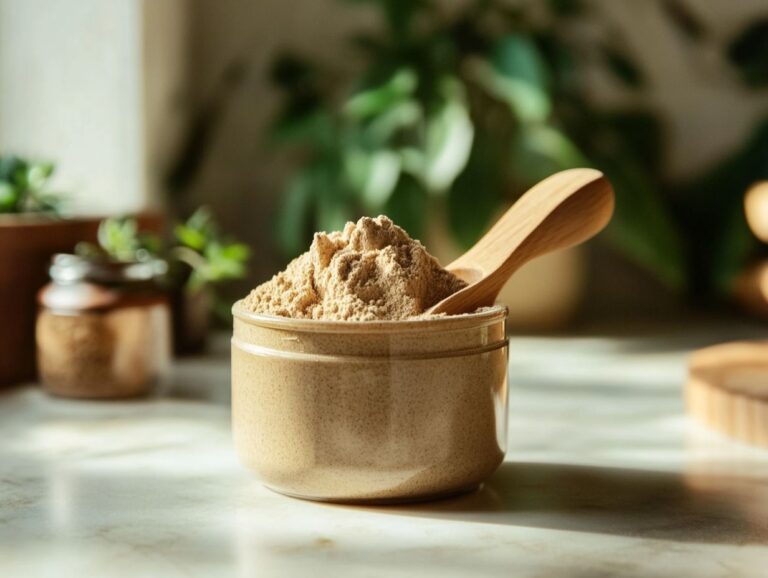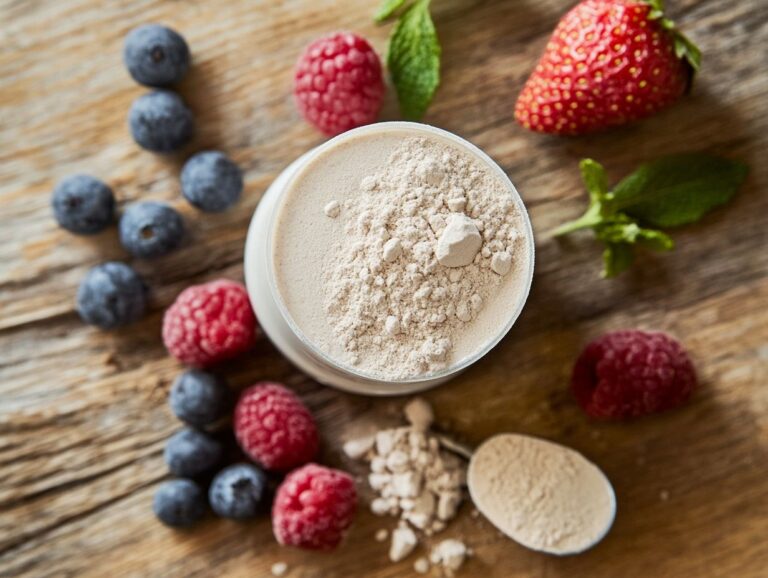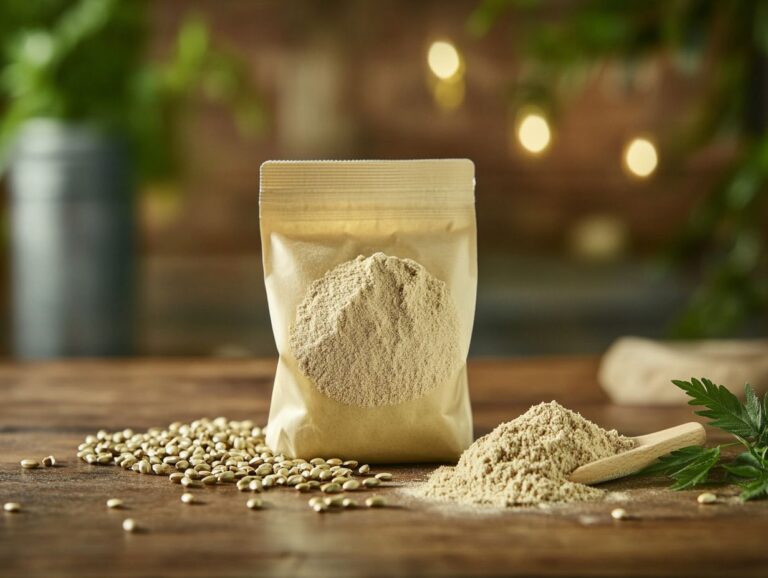Pumpkin seed protein is a nutritious plant-based protein supplement that is gaining popularity among health-minded consumers due to its rich nutrient profile and numerous potential health benefits. This article explores what pumpkin seed protein is, how it is produced, and its advantages for heart health and digestion. It compares the nutritional properties of pumpkin seed protein with those of other plant-based proteins, such as soy and pea, discusses possible side effects, and offers guidance on selecting the best protein replacement product. Additionally, it reviews Omega Nutrition Pumpkin Seed Protein to assist you in making an informed decision.
### Nutritional Properties of Pumpkin Seed Protein
Pumpkin seed protein powder is a highly nutritious supplement derived from whole pumpkin seeds or pumpkin seed meal. The seeds (Cucurbita pepo) are edible byproducts of the pumpkin fruit and are recognized for their pumpkin seeds health benefits. Since pumpkin protein powder is made from whole seeds, it retains the beneficial fats that make pumpkin seeds a healthy food choice. In addition to its protein content, pumpkin seed protein powder is a good source of monounsaturated and polyunsaturated fatty acids, including omega-3 and omega-6 fatty acids.
Pumpkin seeds are particularly rich in magnesium and zinc, two minerals essential for various metabolic processes in the body. In fact, pumpkin seeds are one of the richest plant sources of magnesium, providing nearly 75% of the recommended daily intake (RDI) per 100-gram serving. The same serving also delivers 90% of the RDI for minerals including zinc and iron.
### Benefits of Pumpkin Seed Protein
Like other plant-based protein powders, pumpkin protein powder can be used to supplement an individual’s diet when there is a deficiency or increased demand for protein. Research indicates that pumpkin seed protein has several pumpkin protein benefits:
– **Heart Health**: A study published in the journal *Nutrients* in 2018 found that regular consumption of pumpkin seed protein and its oil reduced the risk of obstructive atherosclerosis in rats, suggesting that it may help lower the risk of cardiovascular diseases.
– **Digestion**: As a supplement made from whole pumpkin seeds, pumpkin seed protein powder retains a high fiber content that supports digestive health. A 2011 study published in *Nutrition Research* found that the fiber in pumpkin seeds can enhance food passage through the digestive tract and improve gut motility.
### Risks of Pumpkin Seed Protein
Similar to soy protein, pumpkin seed protein is a complete protein, meaning it contains all nine essential amino acids that the body cannot produce. This is particularly beneficial for those following a vegan or vegetarian diet, offering an alternative to animal protein sources. However, like many other plant-based protein powders, pumpkin seed protein is typically used as a supplement rather than a sole complete protein source. Due to its high fiber content, pumpkin seed protein powder may cause bloating and digestive discomfort in some individuals. It is advisable to start with a small dosage and gradually increase it to minimize potential side effects.
### Nutritional Value of Pumpkin Seed Protein Powder
Here is the nutritional value of pumpkin seed protein powder per 100 grams:
– **Calories**: 446 kcal
– **Protein**: 56 g
– **Carbohydrates**: 18 g
– **Sugar**: 4 g
– **Fiber**: 6 g
– **Fat**: 20 g
– Saturated Fat: 4 g
– Polyunsaturated Fat: 15 g
– Monounsaturated Fat: 1 g
– Trans Fat: 0 g
– **Cholesterol**: 0 mg
– **Sodium**: 7 mg
– **Potassium**: 702 mg
– **Calcium**: 66 mg
– **Iron**: 7 mg
– **Magnesium**: 592 mg
– **Zinc**: 7 mg
### Choosing a Pumpkin Seed Protein Supplement
Selecting the right pumpkin seed protein powder depends on your intended use and the additional nutritional benefits you seek, such as a certified organic protein. If you aim to meet your entire protein requirement with the supplement, consider the following factors:
– **Protein Concentration**: Pumpkin seed protein powders typically contain 50-70% protein by weight. Choose a powder that aligns with your protein needs.
– **Digestive Health**: If you want to maximize fiber retention, opt for a minimally processed powder. Conversely, if protein content is your priority, consider a more processed option.
– **Taste**: Pumpkin seed protein powder has a stronger, nuttier flavor compared to other plant-based protein supplements like soy or pea. Consider the flavor profile if you plan to incorporate it into smoothies or baking.
### Omega Nutrition Pumpkin Seed Protein Review
Omega Nutrition’s pumpkin seed protein powder is a 100% natural, dairy-free protein product, free from artificial additives or ingredients. Each 20-gram scoop contains 10 grams of protein, 5 grams of fat, 3 grams of carbohydrates, 1 gram of fiber, and 2 grams of water, making it a good source favorable for dietary restrictions. It is a gluten-free product, dairy-free, soy-free, and does not contain artificial flavors.
#### Pros of Omega Nutrition Pumpkin Seed Protein
– Affordable and natural supplement
– Contains healthy fats beneficial for heart health and weight loss
– Supports skin and hair health
#### Cons of Omega Nutrition Pumpkin Seed Protein
– Relatively low protein concentration for a supplement
– Strong flavor that may be unappealing to some consumers
### Where to Buy Omega Nutrition Pumpkin Seed Protein
Omega Nutrition’s pumpkin seed protein powder is available for purchase on the company’s website and on Amazon.
What is Pumpkin Seed Protein?
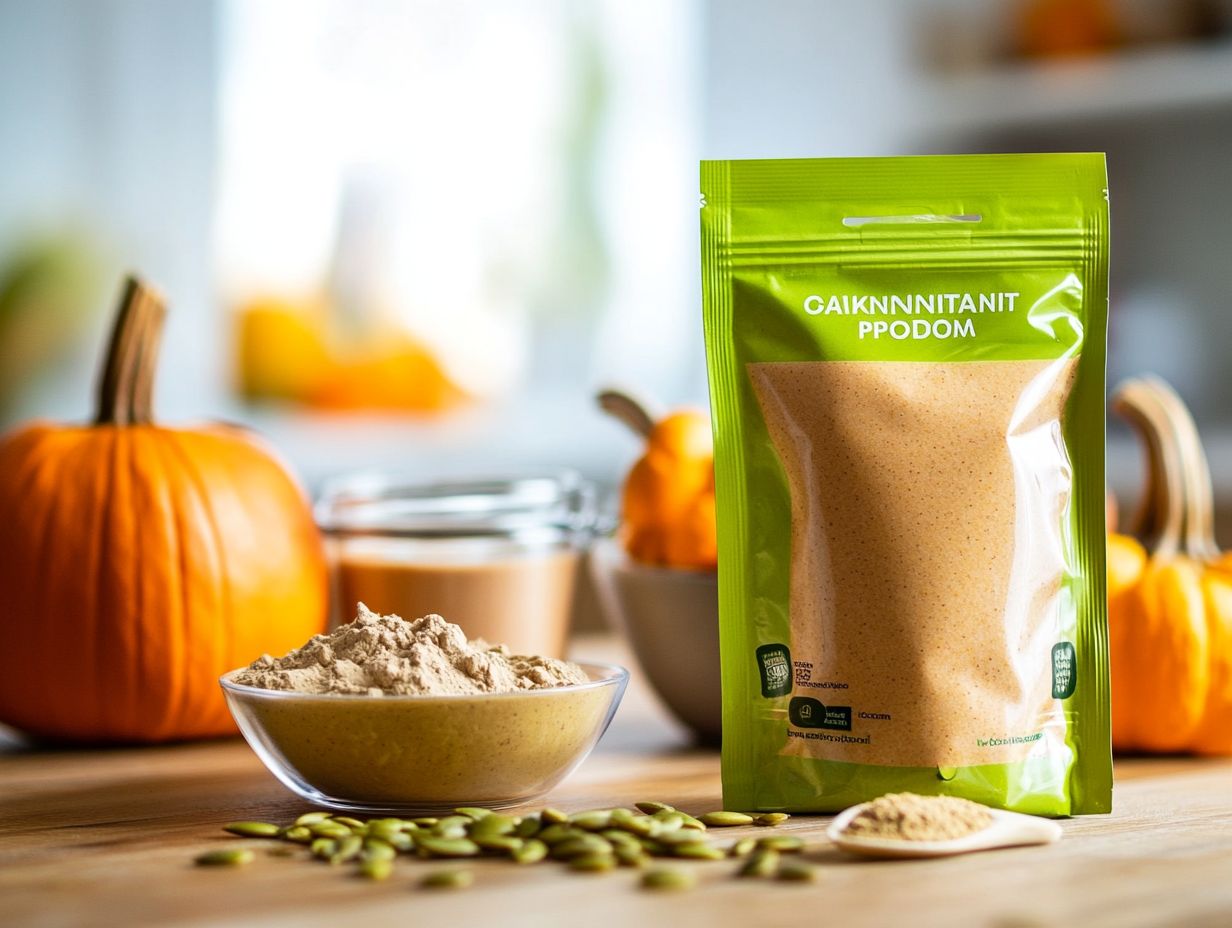
Pumpkin Seed Protein is a highly nutritious plant-based protein extracted from pumpkin seeds, rich in an impressive amino acid profile. It is particularly recognized for its impressive amino acid profile and essential nutrients.
This vegan protein source has gained popularity among health-conscious consumers, including vegans and vegetarians, as it is considered a complete protein that is easy to digest.
With a rich content of minerals such as zinc, magnesium, manganese, and phosphorus, Pumpkin Seed Protein serves as an excellent alternative for those with dietary restrictions, offering a complete protein source. It makes a versatile addition to protein shakes and breakfast smoothies.
How is Pumpkin Seed Protein Made?
The production of pumpkin seed protein involves a meticulous extraction process that begins with sourcing high-quality pumpkin seeds, typically grown in regions such as Eastern Europe, India, and North America to ensure the ingredients are fresh and organic, contributing to a certified organic protein.
The seeds are then cleaned, roasted, and processed to separate the protein from the fiber and oil. This process results in a fine protein powder that retains the beneficial nutrients found in whole pumpkin seeds.
What are the Benefits of Pumpkin Seed Protein?
Pumpkin seed protein offers numerous health benefits, making it an excellent choice for those seeking a high-protein addition to their diet.
It is rich in essential nutrients, including omega-6 and omega-9 fatty acids, magnesium, zinc, and phosphorus.
As a vegan protein source, it accommodates a variety of dietary preferences. Additionally, pumpkin seed protein is easy to digest, making it suitable for health-conscious consumers who prioritize nutritious and wholesome foods.
1. High in Essential Nutrients
Pumpkin seed protein is a highly nutritious source of protein and is rich in zinc, magnesium, phosphorus, and other essential minerals. These nutrients support various aspects of health, including immunity, mood, and muscle recovery.
For instance, zinc is known to enhance immune function and may reduce the incidence of infections, highlighting the health benefits of pumpkin protein. Magnesium is crucial for normal muscle and nerve function, and adequate intake can help decrease the occurrence of muscle cramps and spasms after physical exercise.
Additionally, phosphorus contributes to bone maintenance when combined with calcium, which is vital for maintaining strong bones. Overall, pumpkin seed protein provides a valuable source of protein and minerals that can help keep us energized while also promoting recovery and overall health.
2. Supports Heart Health
Pumpkin seed protein promotes heart health due to its healthy fats, including omega-6 and omega-9 fatty acids, which are essential for cardiovascular function and the prevention of heart diseases.
Additionally, pumpkin seed protein contains antioxidants such as vitamin E and zinc, which support heart health by reducing oxidative stress and inflammation.
Numerous studies indicate that the nutrient content of pumpkin seeds is linked to improved lipid profiles, including lower levels of LDL (bad) cholesterol and higher levels of HDL (good) cholesterol. Furthermore, the magnesium found in pumpkin seeds is associated with better blood pressure regulation, which is vital for preventing cardiovascular diseases.
Therefore, pumpkin seed protein serves not only as a source of essential nutrients but also as a contributor to long-term heart health, supported by its omega-6 EFA and omega-9 content.
3. Promotes Healthy Digestion
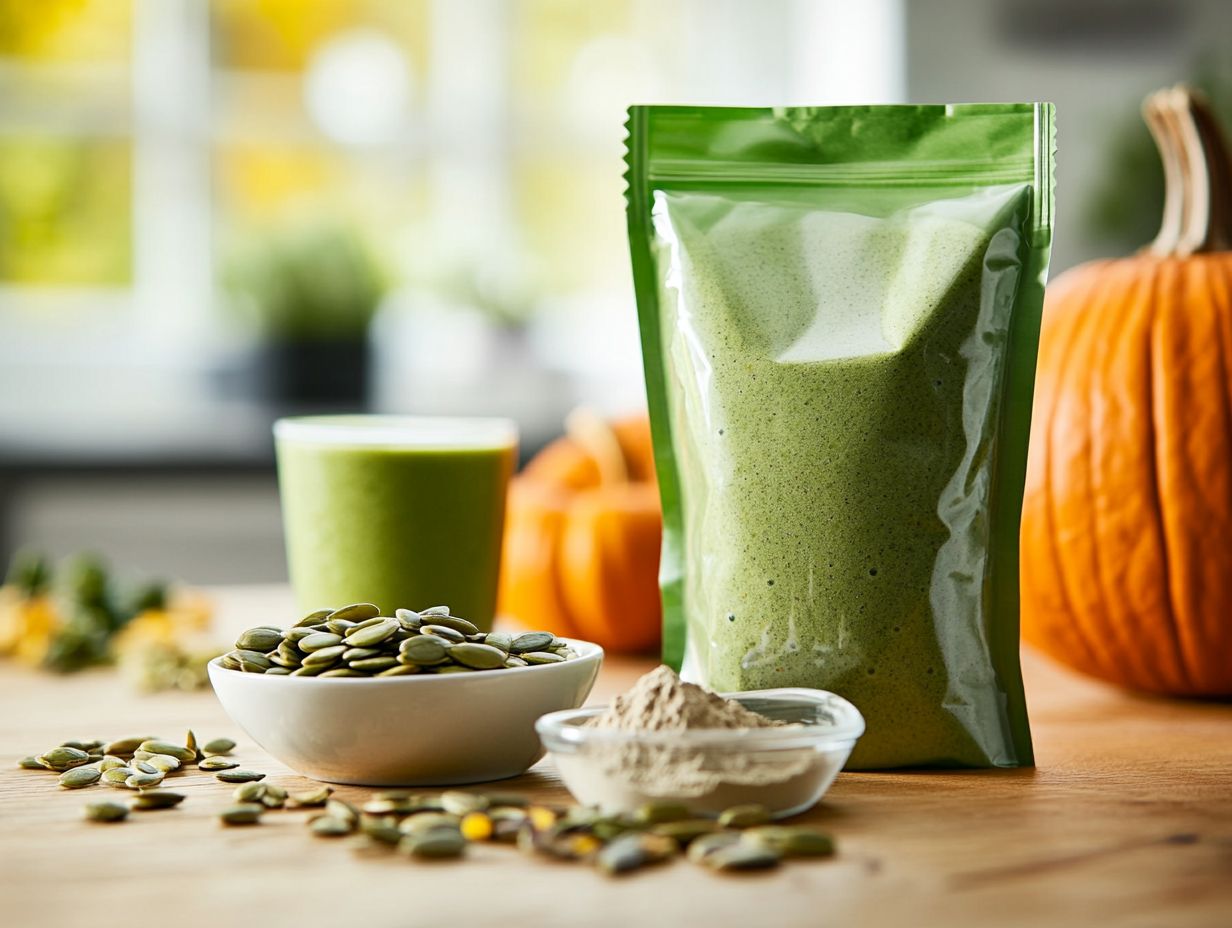
One significant benefit of pumpkin seed protein is its ability to promote healthy digestion. As an easily digestible protein source, it supports gut health and contains dietary fibers that aid in regular bowel movements, making it a suitable choice for those on a dietary restrictions product.
This plant-based protein is especially advantageous for individuals with dietary restrictions, such as those following a gluten-free or vegan lifestyle, as it provides essential nutrients without causing digestive discomfort, and serves as a suitable protein replacement product.
The antioxidants and anti-inflammatory components found in pumpkin seeds positively influence gut flora, helping to maintain a balanced microbiome. This balance is essential not only for digestion but also for overall health; a thriving gut flora can enhance nutrient absorption and bolster the immune system.
Given its high digestibility and high source protein content, pumpkin seed protein is a favorable option for anyone looking to improve their digestive health naturally.
How Does Pumpkin Seed Protein Compare to Other Plant-based Proteins for Vegan and Vegetarian Diets?
Pumpkin seed protein boasts a distinct amino acid profile when compared to other plant-based proteins, such as soy protein, pea protein, and brown rice protein. As a protein replacement product, it serves as a certified organic protein option for health-minded consumers.
What sets it apart is that it is a complete protein source, making it suitable for a wide range of dietary preferences, including vegan and vegetarian diets.
1. Soy Protein
Soy protein is a widely used plant-based protein that is often compared to pumpkin seed protein, as both are complete proteins, making them suitable options for those seeking a vegan protein source. While both soy protein and pumpkin seed protein provide essential amino acids, their nutritional profiles exhibit some important differences.
Pumpkin Seed Protein vs. Soy Protein: Benefits
Soy protein is well-known for its high isoflavone content, which has been shown to offer various benefits, including improved heart health and reduced menopausal symptoms. In contrast, pumpkin seed protein is rich in minerals such as magnesium, zinc, and iron, which are essential for overall health.
For individuals with soy allergies, pumpkin seed protein may be a preferable choice, as well as for those concerned about their phytoestrogen intake. Ultimately, the decision will depend on individual dietary preferences and health needs.
2. Pea Protein
Pea protein is often compared to pumpkin seed protein due to their similar amino acid profiles and suitability for various diets. While both protein sources offer unique nutritional benefits, pumpkin seed protein is particularly rich in magnesium, iron, and zinc, whereas pea protein boasts a high level of the amino acid lysine, making it a valuable protein source overall.
Bioavailability plays a crucial role in protein digestibility, and pea protein is generally recognized for its higher bioavailability. Different diets, such as veganism and bodybuilding, come with distinct nutritional requirements, and both pea and pumpkin seed proteins provide significant flexibility, allowing individuals to tailor their diets to meet their specific needs and preferences.
3. Brown Rice Protein
Brown rice protein is an alternative that, when compared to pumpkin seed protein, often lacks certain essential amino acids. This makes pumpkin seed protein a more favorable source of complete protein, rich in phosphorus and other minerals.
The higher levels of essential amino acids in pumpkin seed protein provide significant benefits, particularly for those looking to increase their protein intake without the carbohydrates found in grains.
Additionally, this plant-based protein is easier for many people to digest and accommodates a wider range of dietary restrictions, as it is a gluten-free product and a dairy-free protein.
Moreover, the high levels of magnesium, zinc, and iron found in pumpkin seed protein not only support muscle building but also contribute to overall wellness, making it an excellent choice for those following vegan and vegetarian diets.
What Are the Potential Side Effects of Pumpkin Seed Protein?
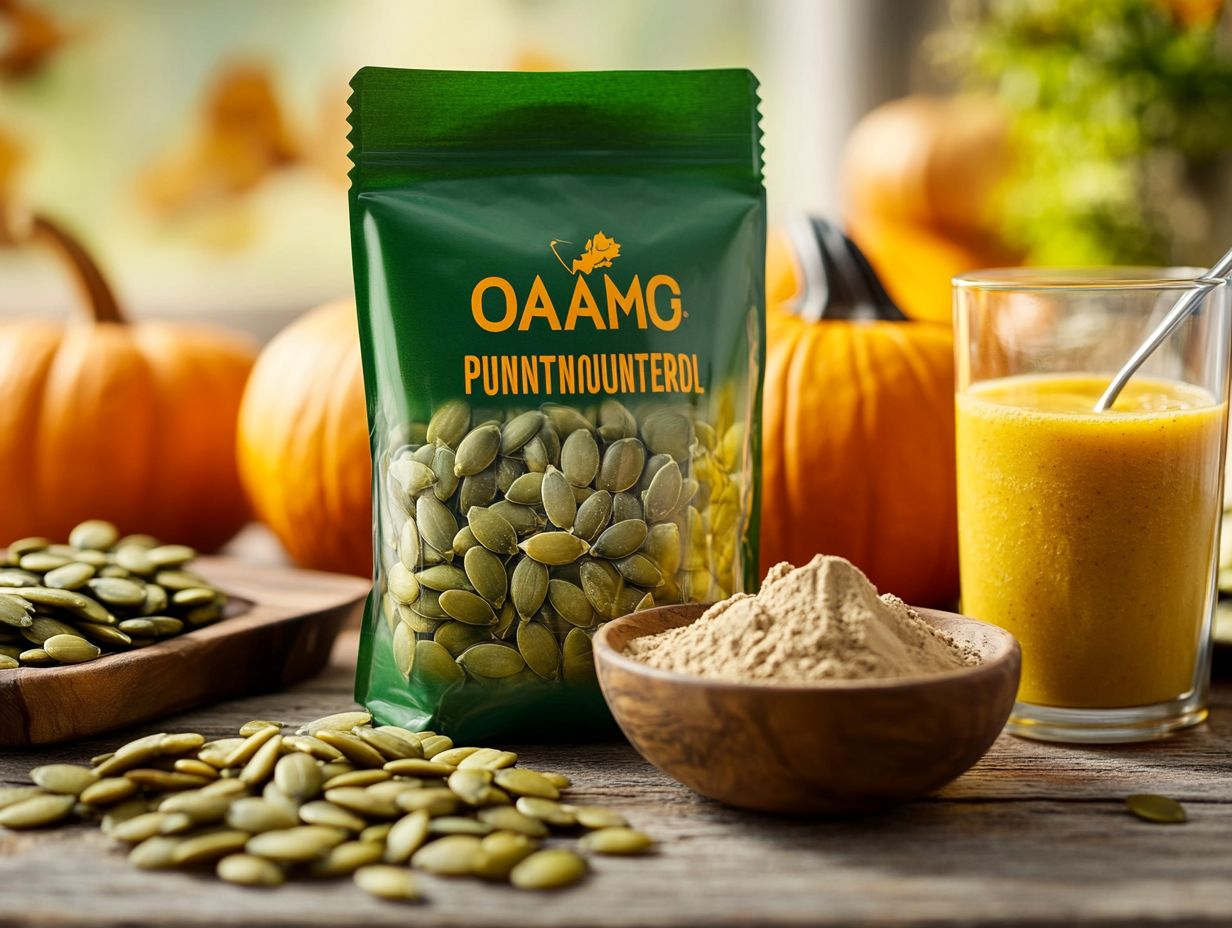
Pumpkin seed protein generally has few side effects; however, some users may experience allergic reactions and digestive issues, particularly if consumed in large quantities or if they have pre-existing allergies to pumpkin seeds.
Individuals with sensitivities should closely monitor their intake and seek medical advice if they experience symptoms such as itching, swelling, or gastrointestinal discomfort.
Overall, pumpkin seed protein can be a healthy addition to the diet, but those with known seed allergies or sensitive digestive systems, such as individuals with irritable bowel syndrome, should exercise caution.
It is advisable to consume pumpkin seed protein in moderation, as excessive amounts may lead to bloating or gas.
By being mindful of these dietary considerations, users can enjoy the health benefits of pumpkin seed protein while minimizing potential negative side effects.
How to Choose the Best Pumpkin Seed Protein Supplement?
Pumpkin seeds health is paramount when selecting a supplement. Ensuring it is rich in critical minerals like copper and iron is essential for optimal health benefits.
To select the best pumpkin seed protein supplement, consider the ingredient list, the source of the pumpkin seeds, and choose a product that is certified organic and non-GMO to align with your dietary restrictions and personal preferences.
1. Check the Ingredients List
When choosing a pumpkin seed protein supplement, the quality of the product is one of the most important factors to consider. It is essential to check the ingredients list to ensure that there are as few additives and fillers as possible, as these can often be detrimental to an individual’s dietary needs.
For instance, some flavored supplements may contain artificial sweeteners, while others may include preservatives or other ingredients that could cause digestive distress for those with specific sensitivities or allergies, particularly among health-minded consumers.
Consumers should carefully examine the ingredients list to ensure that the supplement aligns with their health goals. It is advisable to avoid supplements that contain artificial sweeteners, unnecessary preservatives, or allergens that could disrupt digestion.
The ideal pumpkin seed protein supplements will feature pure pumpkin seed extract with minimal processing, allowing the natural nutrients to stand out. Additionally, supplements enriched with beneficial elements such as omega-3 fatty acids, vitamins, and minerals can significantly enhance the overall nutritional value of the product while providing a robust source of protein.
2. Look for Organic and Non-GMO Options
It is advisable to choose organic and non-GMO pumpkin seed protein supplements, as these products often provide additional health benefits and quality assurances.
Organic pumpkin seed protein indicates that the seeds are grown without the use of synthetic pesticides or fertilizers, which can be detrimental to both the environment and consumer health. Non-GMO signifies that the seeds retain their natural genetic structure, ensuring that their nutritional content remains unchanged.
Along with supporting sustainable agricultural practices, these higher-quality supplements contribute to cleaner sources, which enhance digestion and nutrient absorption.
Therefore, organic and non-GMO pumpkin seed protein is an excellent choice for anyone looking to increase their protein intake and improve their overall nutritional profile.
3. Consider the Source of the Pumpkin Seeds
The origin of the pumpkin seeds used in the protein supplement is crucial, as high-quality seeds sourced from reputable growing regions in North America or Eastern Europe can significantly enhance the quality and nutritional value of the protein.
The source of these seeds plays a vital role in providing a complete spectrum of essential amino acids and important minerals such as magnesium, manganese, and zinc for consumers, particularly those with dietary considerations.
Furthermore, the higher growing standards in these regions ensure that the seeds are free from contaminants, which ultimately benefits the end consumer’s health by promoting proper digestion and absorption of nutrients.
Omega Nutrition Pumpkin Seed Protein Review
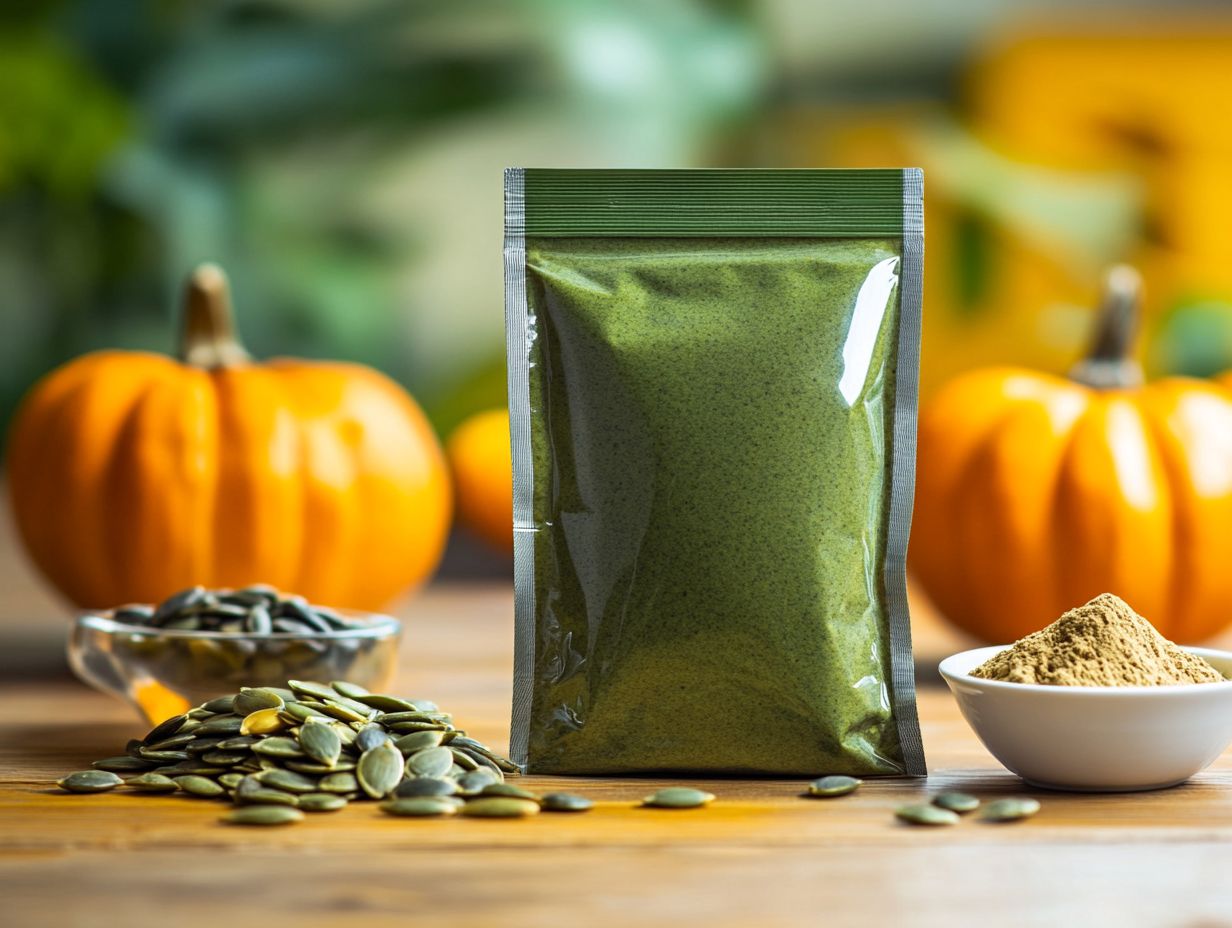
The Omega Nutrition Pumpkin Seed Protein is a well-regarded plant-based protein supplement, celebrated for its high-quality nutrient profile and pleasant taste, particularly among health-conscious consumers.
1. Taste and Texture
Omega Nutrition’s pumpkin seed protein has garnered positive feedback for its taste and texture. Many users appreciate its pleasant flavor and smooth consistency, which make it easy to incorporate into a variety of recipes.
This versatile ingredient has a light nutty flavor that enhances the taste of shakes without being overpowering. Its fine, powdery texture blends seamlessly into smoothies, resulting in a creamier mouthfeel and enriching their nutritional profile.
Users have noted its high protein content, making it an excellent addition to baked goods such as muffins and cookies, where it provides added nutrition and a subtle nutty flavor. Additionally, its versatility in cooking allows it to serve as an effective thickening agent for soups and sauces, ensuring meals are hearty and rich.
By adding pumpkin seed protein to these dishes, not only is the flavor enhanced, but it also supports healthy living, making it a favorite among fitness enthusiasts. Its use in protein shakes for breakfast is particularly popular for those seeking a high source of protein early in the day.
2. Nutrient Profile
Omega Nutrition’s pumpkin seed protein boasts an excellent nutrient profile, delivering complete protein, essential amino acids, and minerals such as zinc and magnesium, all of which support various health benefits.
Incorporating this plant-based protein into your diet can significantly enhance overall health by promoting muscle recovery and boosting immune function. Each serving offers a complete amino acid profile necessary for muscle repair and growth, making it an ideal supplement for athletes and individuals seeking to improve their physical health.
The high mineral content, particularly zinc, aids in proper metabolic processes and supports skin health. Additionally, magnesium is crucial for cardiovascular health and the regulation of muscle function.
Therefore, Omega Nutrition’s pumpkin seed protein serves as a nutritional powerhouse and a versatile product that can easily be incorporated into a variety of meals while supporting health-conscious lifestyle choices. Its benefits include being rich in omega-6 EFA and omega-9, which are essential for maintaining overall health.
3. Price and Value for Money
Omega Nutrition pumpkin seed protein is reasonably priced in comparison to similar products and offers good value among high-quality protein powders, making it an affordable option for those seeking a plant-based protein. Sourced from regions like North America and Eastern Europe, it is hailed for its quality and nutritional benefits.
Many health-conscious consumers, especially those with dietary restrictions, believe that Omega Nutrition effectively balances price with nutritional benefits when compared to other products on the market. The protein quality of pumpkin seed protein, a certified organic protein, is on par with options like pea or hemp protein, which are often more expensive and do not provide significant advantages over pumpkin seed protein.
Additionally, the nutrient-rich profile of pumpkin seed protein, which includes healthy fats, minerals including zinc, magnesium, and manganese, enhances its value. It appeals to individuals who are looking for both a budget-friendly and healthy protein source, as well as those interested in vegan and gluten-free products. Omega Nutrition fits this profile exceptionally well.
4. Customer Reviews
Customer reviews for Omega Nutrition pumpkin seed protein generally indicate a high level of satisfaction. Many users commend its nutritional benefits, versatility, and overall effectiveness as a plant-based protein source that also serves as a complete protein source rich in essential amino acids.
Customers frequently highlight its smooth texture and pleasant nutty flavor, making it an easy addition to protein shakes for breakfast, baking recipes, and even savory dishes. Those seeking plant-based alternatives appreciate the product’s rich amino acid profile, which they find advantageous for muscle recovery and overall health. Its easy-to-digest protein qualities are particularly favored by vegan and vegetarian consumers.
However, a few users have noted that it can be slightly clumpy when mixed with water alone, recommending the use of a blender for optimal results. Overall, the positive feedback significantly outweighs the criticisms, underscoring the product’s popularity among health-minded consumers who value its health benefits and suitability for individuals with dietary considerations such as dairy-free and gluten-free diets.
How to Incorporate Pumpkin Seed Protein into Your Diet?
There are several ways to incorporate pumpkin seed protein into your diet, including adding it to protein shakes and smoothies, enriching them with Omega-6 EFA and Omega-9 for enhanced health benefits.
Here are various methods to enjoy pumpkin seed protein, making it easy and versatile for those looking to include this high source protein supplement in their meals. It is a good source of phosphorus, iron, and copper, making it beneficial for those looking to replace traditional protein products with a more favorable, plant-based option.
